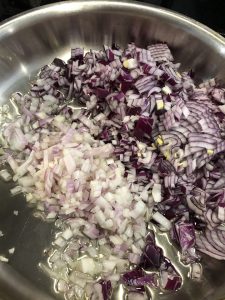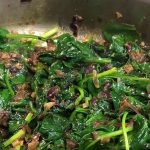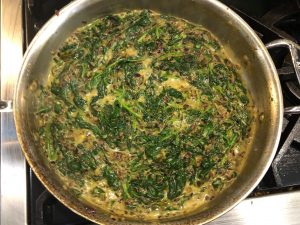Sri Lankan Spinach Curry
A friend asked me for a good spinach curry recipe, and I had to admit that I’ve never managed one I was happy with, so I tried working on it this weekend. I love saag / palak in restaurants, but my earlier attempts came out sort of watery and lacking in flavor; they just made me sad.
So I spent a while looking up recipes, and it seemed like most of the ones I found which might approximate restaurant saag used chopped spinach and went heavy on the cream. Which, okay, cream makes things delicious. But I was hoping to do a vegan version, and also one that was a little bit lighter and healthier, with some good fresh spinach brightness.
The key to that, I think, is the onions. And I know you’ve heard me go on about onions before, and their importance to Sri Lankan cuisine, but seriously, the amount of flavor you get out of a properly cooked onion is hard to beat.
For this, I chopped a mix of red onion and shallot — you could do either separately; I just happened to have both on hand. Yellow or white onions would also be fine, but the red onion and shallots gave a sweetness and delicacy that I thought worked particularly well with the fresh spinach. (And of course, they were awfully pretty contrasting with the curry leaves and green chili as I cooked!)
After that, it was a fairly standard base approach — sauté in oil or ghee with cumin seed and mustard seed (I call for traditional black mustard seed in my recipes, but brown is really fine; I’d avoid yellow, though, as it changes the flavor noticeably) until golden. Keeping heat on medium or even medium-low will reduce the risk of burning if you’ve stepped away to chop something; it’ll take a little longer, but the onions also caramelize beautifully this way, so if you can afford the time, I’d do that.
Add garlic after a bit (if you put it in with the onions initially, it’s susceptible to burning), curry leaves if you have them (there are no good substitutes, so just skip if not), and chopped green chili. (I didn’t have fresh ginger on hand, but if I did, I would have added some with the onions. Since I didn’t, I added a t. of ground ginger later in the dish, with the turmeric and salt.)
This basic approach is what I’d recommend for most of our vegetable curries, and indeed, for curries in general.
I’ve found over the past few years of talking to folks about their cooking habits that a lot of people skip the onions in a dish, or reduce the amount dramatically, not realizing that they’re the base of the flavor. That applies to Italian spaghetti sauce as much as to Sri Lankan curry.
I know chopping onions is a bit of a pain, but it can’t be beat for depth of flavor. There’s a reason why cooking school makes aspiring chefs start with chopping mounds and mounds and mounds of onions. ![]()
*****
So once you have the seasoned onions cooked down nicely (see previous post), the next step is to add some more spices — turmeric and salt are really all you need at this point. And then you could use chopped frozen spinach, but if you have fresh baby spinach, it’s lovely — I dumped two bags in here.
You basically can’t stir them at this point without lots of spinach falling out of your pan (I tried), but if you’re just patient and let it be, within a few minutes the spinach will have reduced enough to stir into the onions for a few more minutes.
You could stop the recipe at this point if you’re aiming for super-healthy low-calorie greens, and it would be tasty! But I definitely wanted a sauce, and anyway, coconut makes things better. So I added 1 cup (half a can) of coconut milk and stirred that in too.
You’re almost done at this point — the last step, always, is to check the seasonings. I’ve been surprised to learn, over the last few years of working on the cookbook, how many people are intimidated by phrases like ‘salt to taste.’
As a very rough estimate, most ‘feed 4-6 people’ dishes I use call for a teaspoon of salt for the pot, so if you’re really not sure, I’d go with something like that.
(Better to undersalt than over, so if you’re not sure, start with 1/2 a teaspoon — you can always add more, but you can’t take salt out of the curry!
If you DO oversalt, that’s tricky to fix — if it’s a dish where you can add potatoes, I’d do that (you can cut them up and cook them in the microwave separately, or boil them, so that you’re adding cooked potatoes to the dish, rather than raw potatoes which will make the whole dish cook for an extra 20-30 minutes, dulling the overall flavors.
Alternately, make a second batch of the dish, without salt. Combine them, so the salt flavors the whole thing more evenly. And if you have too much for your needs, then freeze some. That’s a lot of work, though, and requires you to have enough ingredients on hand to do this. Or you can freeze the over-salted batch to fix on another day, labelling appropriately. Yes, I’ve done this. Have I mentioned that I *hate* wasting food?)
I always take a little bit of sauce at the end, dab it on the back of my left hand, and lick it up to taste. Sometimes it’s perfect; sometimes it wants a little more salt. For this one, I added another 1/2 t. of salt, and then a T of fresh-squeezed lime juice. (Bottled is fine if you don’t have fresh on hand.)
Be a little careful adding lemon or lime if you’re using cream instead of coconut milk — when acid hits hot dairy, it tends to curdle. You’ll make cheese, which is another post altogether. So stir in the cream or coconut milk, let it cook and blend with the other ingredients for a few minutes, make sure your heat is at medium and not boiling over, and THEN add the lime juice.
The result will be glorious. Enjoy with rice and curry, or as we did this weekend, spread on naan and toasted as delicious flatbread / pizza.
Will post actual recipe in next post, with measurements.
Part 3
Sri Lankan Spinach Curry
(30 minutes, serves 4; gluten-free, vegan)
(This is the actual recipe — see previous two posts for Cook’s Illustrated-style explication of recipe development + paean to onions.)
2 medium onions (preferably red), chopped fine
2 T oil or ghee
1 t. black mustard seed
1 t. cumin seed
1 T ginger, chopped
1 dozen curry leaves
3 cloves garlic, chopped fine
1 t. salt
1/2 t. turmeric
22 ounces baby spinach (2 bags)
1 c. coconut milk
1 T lime juice
1. Sauté onions in oil or ghee over medium heat. Add mustard seed, cumin seed, ginger, and curry leaves.
2. After a few minutes, add chopped garlic, salt, and turmeric, and continue cooking until golden-translucent, stirring as needed, about 15 minutes total.
3. Add spinach to pan (in two batches if necessary, depending on size of pan), let cook down for a few minutes. When reduced, stir into onions and cook for a few more minutes.
4. Add coconut milk and stir; add lime juice and stir. Taste and adjust seasonings if needed. Serve hot with rice or roti.
*****
I could photograph this spinach curry ALL DAY. ![]()
(And hey, ten years in, my zinc island countertop really has weathered and patinated the way I’d hoped. Makes me so happy. (It’s not heat-proof, though, so use with care.))
(Sri Lankan spinach curry recipe in previous post.)










